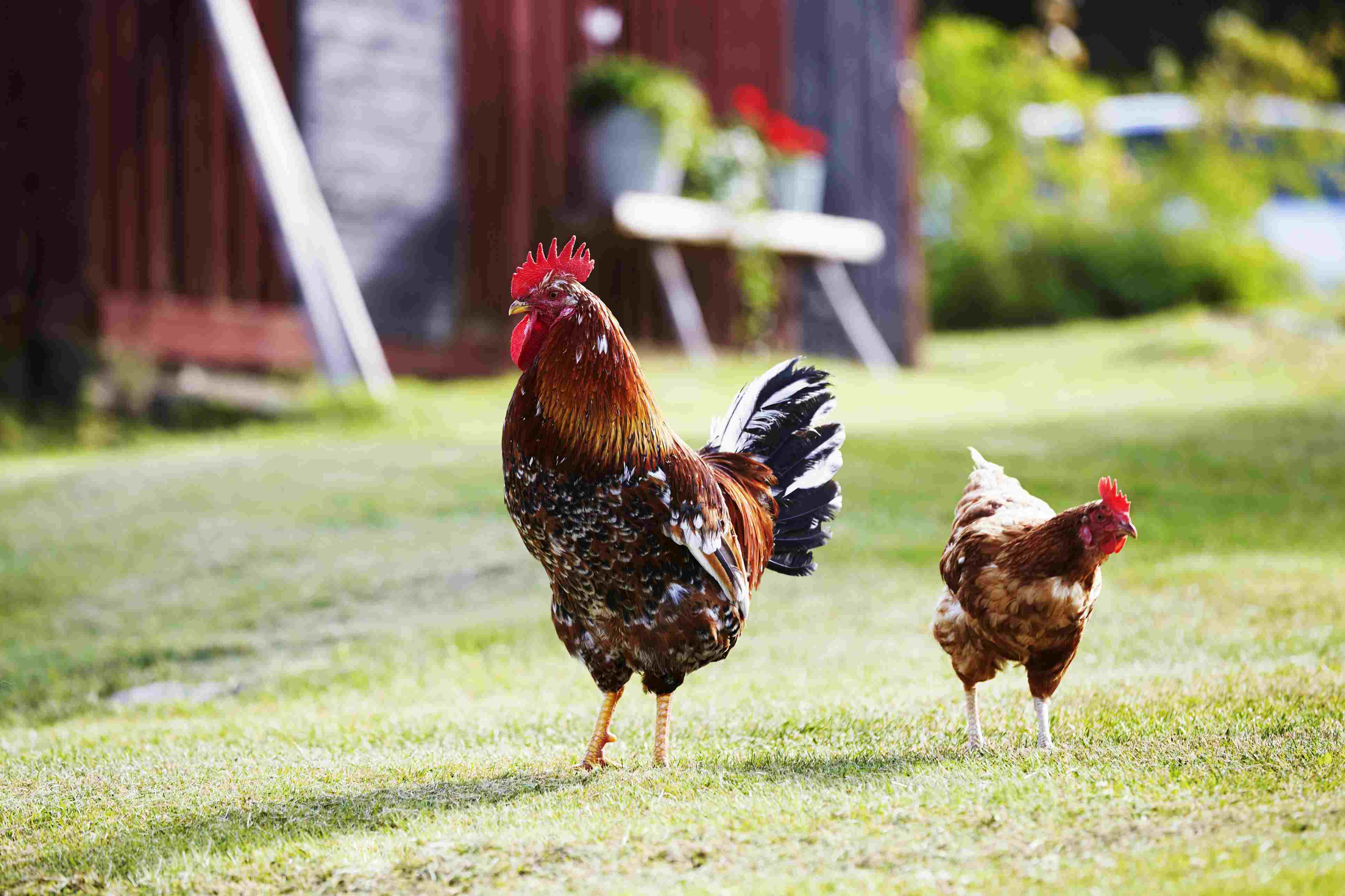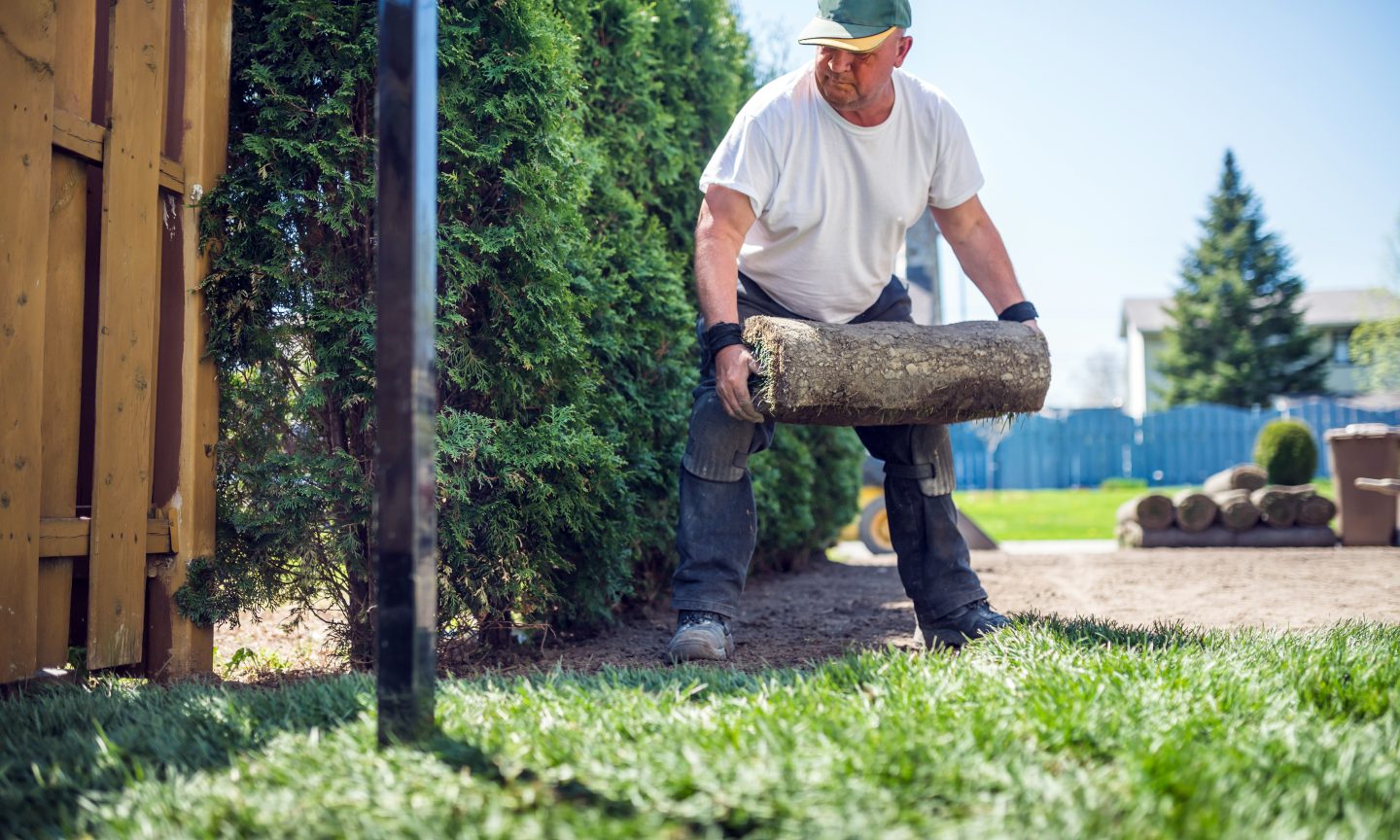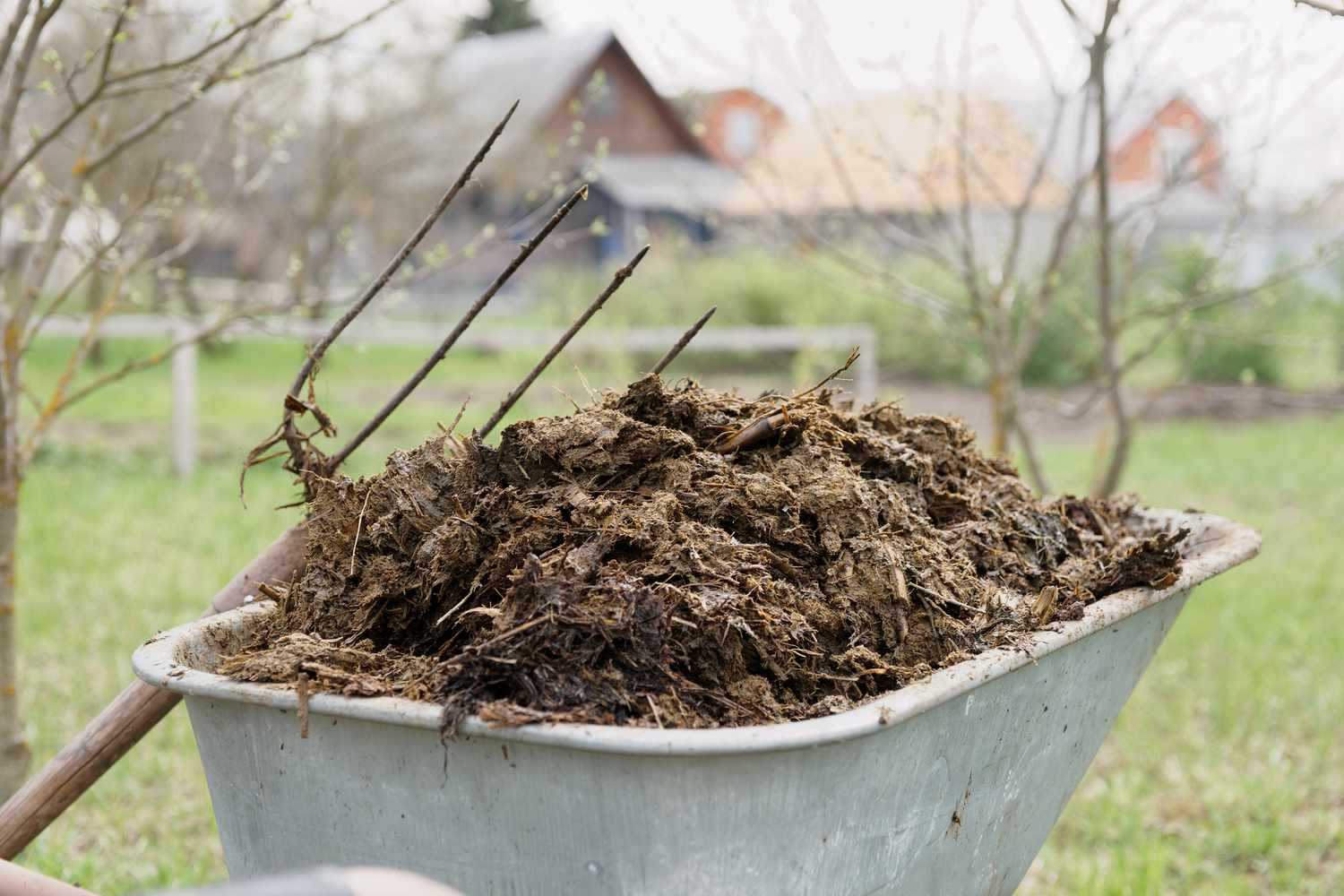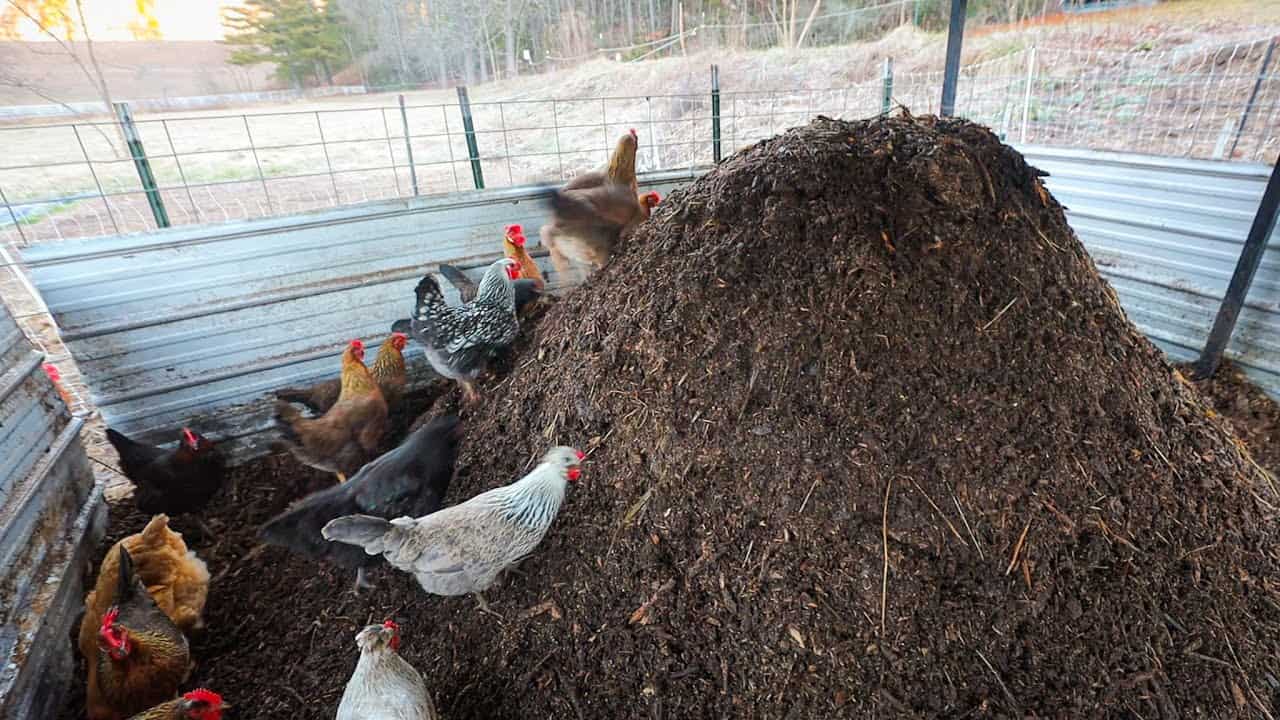Home>Gardening Basics>How To Have Backyard Chickens


Gardening Basics
How To Have Backyard Chickens
Published: August 5, 2023
Discover the essential steps for getting started with backyard chickens and create a thriving and rewarding experience for yourself and your feathered friends.
(Many of the links in this article redirect to a specific reviewed product. Your purchase of these products through affiliate links helps to generate commission for Chicagolandgardening.com, at no extra cost. Learn more)
Table of Contents
Introduction
Keeping backyard chickens has become increasingly popular among homeowners who want to enjoy the benefits of having fresh eggs, organic pest control, and the therapeutic joy of caring for these feathered friends. It’s a rewarding and sustainable hobby that allows you to connect with nature and have a constant supply of delicious and nutritious eggs right in your own backyard.
Having backyard chickens is not only a fun and educational experience for both adults and children, but it also brings a multitude of benefits. Not only do chickens provide fresh eggs, but they also help with composting, provide natural pest control by foraging, and contribute to a more sustainable lifestyle.
But before diving headfirst into the world of backyard chickens, it’s important to understand that it requires careful planning and preparation. You need to consider factors such as local regulations, space availability, and the necessary time and effort required to care for these feathered companions.
In this article, we will guide you through the process of starting your own backyard chicken flock. From choosing the right chicken breed to building a chicken coop and ensuring their proper care and nutrition, we’ll cover all the essential steps to get you started on your exciting journey of raising happy and healthy chickens.
So, whether you’re a beginner or an experienced hobbyist, sit back, grab a cup of coffee, and let’s explore the world of backyard chickens together!
Why Have Backyard Chickens?
There are numerous reasons to consider having backyard chickens, ranging from the practical benefits they provide to the satisfaction of connecting with nature. Here are some compelling reasons why you should consider starting your own flock:
- Fresh and Nutritious Eggs: One of the main motivations for many people to keep chickens is having a regular supply of fresh eggs right from their own backyard. Unlike store-bought eggs, backyard eggs are known for their superior taste, vibrant yolks, and higher nutritional value.
- Organic Pest Control: Chickens are natural foragers and excel at seeking out insects, worms, and larvae. By allowing chickens to roam freely in your backyard, they will help control pests, reducing the need for chemical pesticides.
- Sustainable Living: Raising chickens is an integral part of a self-sufficient lifestyle. They assist in reducing kitchen waste through composting, and their manure can be used as an excellent fertilizer for your garden, promoting organic and eco-friendly practices.
- Teaching Opportunity for Children: Keeping backyard chickens provides a unique opportunity to teach children about responsibility, compassion, and the circle of life. Children can learn about caring for animals, the importance of sustainable food sources, and the joy of observing the life cycle of chickens firsthand.
- Therapeutic and Relaxing: Observing and interacting with chickens can have a calming effect on your mental well-being. The rhythmic pecking and scratching, coupled with their gentle clucking, can provide a sense of peace and tranquility, reducing stress and anxiety.
- Connection to Nature: Having backyard chickens allows you to reconnect with nature, fostering a deeper appreciation for the environment and the animals that share our planet. It can be a therapeutic escape from the fast-paced digital world we live in.
With all these benefits, it’s no wonder that many people are embracing the idea of keeping chickens in their own backyard. Not only do they provide fresh and delicious eggs, but they also contribute to a more sustainable, educational, and fulfilling lifestyle. So, if you have the means and the desire, why not embark on this rewarding journey of raising backyard chickens?
Planning and Preparation
Before bringing home your first chickens, it’s crucial to plan and prepare for their arrival. This involves considering various factors to ensure you can provide a safe and comfortable environment for your feathered friends. Here are some key steps to take:
- Research Local Regulations: Check your local regulations and zoning laws to ensure that backyard chickens are allowed in your area. Some municipalities have restrictions on the number of chickens you can keep or require permits. Ensuring compliance will save you from potential legal issues down the line.
- Assess Available Space: Evaluate the available space in your backyard to determine the appropriate size of your chicken coop and the number of chickens you can comfortably accommodate. Each chicken requires at least four square feet of indoor space and a minimum of ten square feet in an outdoor run.
- Determine Your Objectives: Consider your goals for having backyard chickens. Are you primarily interested in egg production or do you also want them for meat? This will help you choose the right breed and plan for their specific needs accordingly.
- Evaluate Costs: Determine your budget for acquiring chickens, building a coop, and ongoing maintenance. Factor in costs such as feed, bedding, healthcare, and any necessary equipment like feeders and waterers.
- Secure Perimeter: Predators pose a threat to chickens, so it’s important to secure the perimeter of your coop and run. Install fencing that extends underground to prevent digging predators, and cover the top to protect against aerial attacks.
- Source Chickens: Choose a reputable source to obtain your chickens. You can opt for purchasing day-old chicks or pullets (young female chickens nearing egg-laying age). Ensure that the chickens are healthy, vaccinated, and suitable for your climate.
- Prepare the Coop: Construct a spacious and well-ventilated chicken coop to provide shelter and protection from the elements. Include features like nesting boxes, roosting bars, and adequate lighting. Ensure the coop is predator-proof with sturdy locks and hardware cloth.
- Gather Essential Supplies: Gather the necessary supplies such as chicken feed, bedding material, waterers, feeders, and cleaning tools. Set up a feeding and watering station in the coop and create a comfortable and sanitary environment for the chickens.
- Learn Basic Care Practices: Familiarize yourself with basic care practices such as feeding, watering, cleaning, and recognizing signs of illness. Having a basic understanding of chicken behavior and health will help you provide the best care for your flock.
By taking the time to plan and prepare properly, you will lay a solid foundation for a successful and enjoyable backyard chicken keeping experience. Adequate planning ensures that you can provide a safe and comfortable home for your chickens, allowing them to thrive and provide you with the joy and rewards of backyard poultry ownership.
Choosing the Right Chicken Breed
When it comes to selecting the right chicken breed for your backyard, there are a few factors to consider. Each breed has its unique characteristics, including temperament, egg production, meat quality, and adaptability to various climates. Here’s what you should keep in mind:
- Temperament: Consider the temperament of the chicken breed. Some chickens are known for being docile and friendly, making them great for families with children. Others may be more skittish or aggressive, which may not be suitable for a backyard setting.
- Egg Production: If your primary goal is to have a consistent supply of fresh eggs, choose a breed known for its egg-laying capabilities. Breeds like the Rhode Island Red and the Sussex are known for their excellent egg production.
- Meat Quality: If you plan to raise chickens for meat production, select a breed specifically bred for meat. These breeds, such as the Cornish Cross, are known for their fast growth rate and tender meat.
- Climate Adaptability: Consider the climate in your area and choose a breed that is well-suited for it. Some breeds thrive in cold climates, while others are more heat-tolerant. The Australorp and the Orpington are popular breeds known for their adaptability to various climates.
- Heritage or Hybrid: Decide if you want heritage breeds or hybrid breeds. Heritage breeds are traditional breeds with historic significance, while hybrids are crossbred for specific traits like egg-laying or meat production. Both types have their advantages and appeal.
- Space Requirements: Evaluate the available space in your backyard and choose a breed that suits it. Some breeds are more active and require more space to roam, while others are content with smaller areas.
- Availability: Check the availability of the chicken breed in your area. Some breeds may be more difficult to find or may require ordering from a hatchery or breeder.
Ultimately, the right chicken breed for you will depend on your specific goals, preferences, and the resources you have available. It’s important to do thorough research and consider the unique qualities of each breed to make an informed decision. Consulting with local experts or experienced chicken keepers can also provide valuable insights into the suitability of different breeds for your region.
By carefully selecting the right chicken breed for your backyard, you can ensure a harmonious and productive flock that perfectly suits your needs and preferences.
Building the Chicken Coop
The chicken coop is a vital component of backyard chicken keeping. It provides a safe and comfortable shelter for your chickens, protecting them from predators and the elements. Here are some important considerations when building your chicken coop:
- Coop Size: Determine the appropriate size of your coop based on the number of chickens you plan to keep. Each chicken requires a minimum of four square feet of indoor space. Allow for additional space if you have larger breeds or if your chickens will spend extended periods in the coop due to weather conditions.
- Location: Choose a suitable location for the coop. It should be well-drained, have access to natural light, and be easily accessible for cleaning and maintenance. Consider the direction of prevailing winds and provide adequate ventilation for proper airflow.
- Security: Ensure the coop is predator-proof. Use sturdy materials for construction and reinforce vulnerable areas like windows and doors with hardware cloth. Add an apron or bury fencing around the perimeter to prevent digging predators from gaining access.
- Nesting Boxes: Provide comfortable and secluded nesting boxes for your hens to lay their eggs. Each hen requires one nesting box, with dimensions around 12×12 inches. Fill the nesting boxes with soft bedding material such as straw or wood shavings.
- Roosting Bars: Install roosting bars for your chickens to perch on at night. Use rounded and smooth materials, like wooden dowels, with a diameter of about 2-3 inches. Allow for at least 8 inches of roosting space per chicken.
- Flooring and Bedding: Choose appropriate flooring materials for the coop. Popular options include concrete, hardwood, or plywood. Cover the floor with a layer of pine shavings or straw to provide a clean and absorbent surface for your chickens.
- Ventilation and Insulation: Proper ventilation is crucial for maintaining good air quality and reducing moisture buildup. Install windows or vents that can be opened and closed as needed. Consider insulation if you live in an area with extreme temperatures.
- Lighting: Provide sufficient lighting in the coop. Chickens require 14-16 hours of daylight for optimal egg production. Install artificial lighting if needed, using heat-resistant and energy-efficient bulbs.
- Access and Cleaning: Ensure easy access for cleaning and maintenance. Include doors and panels that allow you to reach all areas of the coop. Regularly clean and disinfect the coop to maintain a healthy environment for your flock.
- Run or Outdoor Space: Consider providing an outdoor run or enclosure for your chickens to spend time outside. The fenced area should be spacious, secure, and have protection from predators and the weather.
Building a chicken coop requires careful planning, attention to detail, and consideration of your specific needs and circumstances. There are various coop designs and plans available online or through local resources, catering to different budgets and skill levels. Remember, the goal is to create a comfortable and secure space where your chickens can thrive and feel safe.
By investing time and effort into building a well-designed and functional chicken coop, you’ll be setting the stage for a successful and enjoyable backyard chicken keeping experience.
Feeding and Watering
Proper nutrition is essential for the health and well-being of your backyard chickens. Understanding their dietary requirements and providing them with clean water are crucial aspects of responsible chicken ownership. Here are some key points to consider when it comes to feeding and watering your flock:
- Provide a Balanced Diet: Chickens need a balanced diet that includes a mix of grains, protein, vitamins, and minerals. You can provide commercial chicken feed that is specifically formulated for their needs. Make sure the feed is appropriate for the age and purpose of your chickens, whether they are layers or meat birds.
- Supplement with Fresh Greens: Give your chickens access to fresh greens, vegetables, and kitchen scraps. They will enjoy foraging and pecking at grass, weeds, and bugs, which contribute to a well-rounded diet and promote natural behavior.
- Offer Grit and Calcium: Provide grit, such as small rocks or oyster shells, to help break down food in their gizzard and aid digestion. Calcium supplements, such as crushed eggshells or oyster shell, are crucial for proper eggshell formation in laying hens.
- Avoid Harmful Foods: Do not feed your chickens toxic or harmful foods, including chocolate, avocado, onions, and foods high in salt or sugar. Also, avoid feeding them spoiled or moldy food, as it can lead to health issues.
- Provide Fresh Water Daily: Ensure that your chickens always have access to clean and fresh water. Keep the waterers or containers elevated to prevent contamination with dirt, droppings, or bedding. In freezing temperatures, use heated waterers to prevent the water from freezing.
- Monitor Daily Consumption: Regularly observe the amount of feed your chickens consume. Sudden changes in eating habits or decreased appetite may indicate health issues or inadequate nutrition. Adjust feeding amounts accordingly.
- Observation and Adjustments: Monitor the health and condition of your chickens. Overweight or underweight birds may require adjustments to their diet. Consult with a poultry veterinarian or local experts if you have any concerns or questions.
- Clean and Sanitize Feeders: Regularly clean and disinfect the feeders to prevent the buildup of bacteria or parasites. Remove any wet or spoiled feed promptly to maintain the quality and freshness of the feed.
Remember, providing a balanced diet and clean water is crucial to the overall health, growth, and productivity of your flock. Feed your chickens high-quality feed, supplement with fresh greens and appropriate supplements, and ensure a reliable source of fresh water. Happy and healthy chickens will reward you with vibrant plumage, strong egg production, and a delightful presence in your backyard.
Providing Proper Shelter
Ensuring that your backyard chickens have a suitable shelter is vital for their safety, comfort, and overall well-being. Here are some important factors to consider when providing proper shelter for your flock:
- Protection from Weather: Construct a coop that offers protection against extreme weather conditions such as heat, cold, rain, and wind. Insulate the coop if you live in an area with harsh winters or scorching summers.
- Adequate Ventilation: Proper ventilation is crucial to maintain good air quality and prevent the buildup of moisture, odors, and harmful gases inside the coop. Install windows or vents that can be opened and closed to promote airflow.
- Space Requirements: Provide enough space inside the coop for your chickens to move freely. Each chicken should have a minimum of four square feet of indoor space. Consider their size and breeds that require more space.
- Nesting Boxes: Include nesting boxes in the coop where your hens can comfortably lay their eggs. Provide one nesting box for every three to four hens, with dimensions of around 12×12 inches.
- Roosting Perches: Install roosting perches for your chickens to rest and sleep on at night. Use smooth and rounded materials like wooden dowels, positioning them at an appropriate height, allowing about 8 inches of roosting space per chicken.
- Sanitary Conditions: Maintain cleanliness and hygiene inside the coop. Regularly clean the coop, remove droppings, and replace bedding materials. This helps prevent the spread of diseases and parasites.
- Security from Predators: The coop should be designed and built to keep predators out. Use sturdy materials and reinforce vulnerable areas such as doors and windows with hardware cloth. Consider burying fencing or adding an apron to prevent predators from digging under the coop.
- Natural Lighting: Provide natural light in the coop to promote the chickens’ well-being. This helps regulate their sleep-wake cycle and stimulates egg production. Install windows or clear roofing materials to allow natural light to enter.
- Perimeter Fencing: Enclose the outdoor area of the coop with secure fencing to prevent your chickens from wandering off and being exposed to potential dangers. The fencing should also deter predators from entering the outdoor space.
- Maintain Shelter Integrity: Regularly inspect the coop and repair any damage promptly. Check for loose boards, gaps, or areas where predators could gain access. Regular maintenance ensures the long-term durability and safety of the shelter.
By providing proper shelter, you create a safe and comfortable environment for your backyard chickens to thrive. A well-designed coop protects them from harsh weather, predators, and disease while offering adequate space, ventilation, and essential nesting and roosting areas. Taking the time to ensure the shelter meets the needs of your flock will contribute to their overall health, happiness, and productivity.
Health and Grooming
Maintaining the health and well-being of your backyard chickens is essential for their longevity and productivity. Regular health checks, proper grooming, and disease prevention practices are crucial. Here are some important aspects to consider when it comes to the health and grooming of your flock:
- Regular Health Checks: Monitor your chickens regularly for any signs of illness or injury. Look for abnormal behavior, respiratory issues, changes in appetite or drinking habits, feather loss, or unusual droppings. Early detection is key to addressing health issues promptly.
- Parasite Prevention: Implement a regular parasite prevention routine. Parasites such as mites, lice, fleas, and worms can be detrimental to your chickens’ health. Use appropriate treatments, such as dust baths, herbal remedies, or veterinarian-recommended products to keep parasites at bay.
- Vaccinations: Consult with a poultry veterinarian or local agricultural extension office to determine if vaccinations are necessary in your area. Vaccinations can help prevent common diseases such as Marek’s disease or Newcastle disease.
- Proper Nutrition: Provide a balanced diet to ensure your chickens receive the necessary nutrients for optimal health. Consult with a poultry nutrition specialist or veterinarian to develop a feeding plan that meets the specific needs of your flock.
- Hygiene and Cleanliness: Maintain a clean environment to prevent the spread of disease and parasites. Regularly clean the coop, remove droppings, and replace bedding materials. Provide clean and fresh water daily.
- Wing Clipping: Consider wing clipping to prevent your chickens from flying over fences or escaping from their designated area. This helps keep them safe from predators and reduces the risk of injury.
- Beak and Nail Trimming: Check your chickens’ beaks and nails regularly. If their beaks become overgrown or their nails are too long, they may need trimming. Consult a poultry expert or veterinarian for guidance on proper trimming techniques.
- Egg Inspection: Regularly inspect eggs for any abnormalities. Discard eggs with cracks, abnormal shapes, or signs of contamination. Collect eggs frequently to prevent them from being pecked or becoming dirty.
- Stress Management: Minimize stressors in your chickens’ environment. Provide a calm and quiet setting, avoid sudden changes, and introduce new chickens gradually. Stress weakens their immune system, making them more susceptible to disease.
- Quarantine: If you introduce new chickens to your flock, isolate them in a separate area for a quarantine period. This helps prevent the spread of potential diseases and allows you to observe their health before integrating them with the rest of the flock.
By prioritizing the health and grooming needs of your flock, you can ensure their well-being and longevity. Regular checks, proper nutrition, hygiene practices, and disease prevention measures are crucial in maintaining a healthy and productive flock of backyard chickens.
Egg Production and Care
Egg production is often one of the main reasons for keeping backyard chickens. To maximize their egg-laying potential and ensure the quality and safety of the eggs, there are several factors to consider in terms of egg production and care:
- Laying Cycle: Understand the natural laying cycle of chickens. Most hens begin laying eggs around 5-6 months of age and will continue for a few years. After that, egg production may decrease. Some breeds are known for higher egg production than others.
- Nesting Boxes: Provide clean and comfortable nesting boxes for your hens to lay their eggs. Make sure the nesting boxes are in a quiet and secluded area to encourage them to lay in the desired location.
- Collect Eggs Regularly: Collect eggs at least once a day to maintain their freshness and quality. Handle eggs carefully to prevent cracking or damaging the protective cuticle on the shell.
- Egg Cleaning: In most cases, eggs laid by healthy chickens do not require washing. If eggs are dirty or soiled, gently wipe them with a dry cloth or use a fine-grit sandpaper to remove any debris.
- Proper Storage: Store eggs properly to maintain their freshness and quality. Store them in a cool place (around 45-50°F) with consistent humidity, away from strong odors or contaminants. Avoid storing eggs near strong-smelling foods like onions or garlic.
- Consumption and Rotation: Use the “first-in, first-out” principle when consuming eggs. Make sure to use the oldest eggs first to prevent spoilage. Rotate the eggs to ensure they are used before they become too old.
- Egg Quality: Monitor and evaluate the quality of the eggs. Discard any eggs with cracks, abnormal shapes, or signs of contamination. Quality eggs should have a clean and intact shell, a well-formed yolk, and a thick egg white.
- Supplemental Lighting: If you want to increase egg production during the winter months when daylight hours are shorter, consider supplementing natural lighting. Artificial lighting can stimulate hens to continue laying consistently.
- Calcium Supplementation: Provide calcium supplements, such as crushed eggshells or oyster shell, to your laying hens. Calcium is crucial for the development of strong and healthy eggshells.
- Monitor Egg Consumption: Monitor the egg consumption of your flock. If you notice a sudden decrease in egg production or any abnormalities, it may be an indication of health issues or stress factors that need to be addressed.
- Egg Sharing or Selling: If you have an abundance of eggs, consider sharing or selling them to friends, family, or neighbors. Remember to check local regulations and obtain any necessary permits or licenses required for selling eggs.
By focusing on proper egg production and care, you can enjoy a steady supply of fresh and delicious eggs from your backyard flock. Providing optimal nesting conditions, regular collection, appropriate storage, and monitoring egg quality will help ensure the best possible egg-laying experience for your chickens and the highest quality eggs for your consumption or sharing with others.
Dealing with Common Challenges
While keeping backyard chickens can be an enjoyable and rewarding experience, it’s not without its challenges. It’s important to be prepared for and address these common issues to ensure the well-being of your flock. Here are some common challenges you may encounter when raising backyard chickens and how to overcome them:
- Predators: Predators pose a threat to chickens, including raccoons, foxes, and birds of prey. Implement measures to secure the coop and outdoor area with sturdy fencing, locks, and covers. Consider using motion-activated lights or audible deterrents to deter predators.
- Disease: Chickens can be susceptible to various diseases, such as respiratory illnesses, parasites, or infections. Practice good biosecurity measures by quarantining new birds, maintaining cleanliness, and providing proper nutrition and veterinary care. Regularly observe your flock for signs of illness and consult with a poultry veterinarian if needed.
- Egg Eating: Occasionally, chickens may develop a habit of egg eating, which can be problematic. Combat this behavior by collecting eggs frequently to prevent them from being pecked. Provide a comfortable nesting environment with soft bedding and consider adding golf balls or wooden eggs to the nest to discourage pecking.
- Bullying and Pecking: Chickens establish a pecking order, but sometimes aggression can lead to excessive bullying or feather pecking. Ensure adequate space and enrichment in the coop and run to minimize stress. Provide distractions such as hanging treats or toys to redirect their attention.
- Broodiness: Some hens may become broody, meaning they want to sit on and hatch eggs. While natural, broodiness can disrupt egg production. If you do not wish to breed, break broodiness by removing the hen from the nest and providing a cooler environment.
- Molting: Chickens undergo a molt annually, during which they shed and replace their feathers. This can disrupt egg production. Ensure a balanced diet with sufficient protein during this period to support healthy feather regrowth. Be patient, as egg production will resume after the molt.
- Overcrowding: Overcrowding can lead to stress, aggression, and a decline in egg production. Ensure each chicken has enough space, both in the coop and in the outdoor run or yard. Provide a minimum of four square feet per chicken indoors and ample space for foraging outside.
- Environmental Factors: Extreme temperatures, such as heatwaves or cold snaps, can affect chickens. Provide shade, proper ventilation, and access to clean water in hot weather. Insulate and provide additional heat sources in cold weather to prevent frostbite.
- Escape Attempts: Chickens are curious and may attempt to escape their designated area. Regularly inspect fences and fix any potential weaknesses. Trim the wings of flighty breeds or ones prone to flying to discourage escaping over fences.
- Neighbor Relations: Address concerns from neighbors about noise, odor, or the presence of chickens. Keep communication open and maintain cleanliness to minimize any potential disruption. Offer fresh eggs as a gesture of goodwill and educate neighbors about the benefits of backyard chickens.
Remember, challenges are part of the journey of raising backyard chickens. By staying vigilant, being proactive in addressing issues, and seeking advice from experienced chicken keepers or professionals when needed, you can navigate these common challenges and enjoy a successful and fulfilling experience with your backyard flock.
Conclusion
Embarking on the journey of keeping backyard chickens is a delightful and rewarding endeavor. From the joy of collecting fresh eggs to the harmonious connection with nature, raising chickens in your own backyard offers numerous benefits. However, it requires careful planning, preparation, and ongoing care to ensure the health, safety, and well-being of your flock.
Throughout this article, we have explored the various aspects of starting your own backyard chicken flock. We discussed the reasons why having backyard chickens is appealing, such as the joy of fresh eggs, sustainability, and the opportunity to teach children about responsibility and nature. We emphasized the importance of planning and preparation, including understanding local regulations, assessing space requirements, and sourcing healthy chickens.
We also discussed the key considerations when building a chicken coop, such as providing adequate shelter, ventilation, and security from predators. Additionally, we covered the essentials of feeding and watering, emphasizing the importance of a balanced diet and clean water for optimal health. The section on health and grooming highlighted the significance of regular health checks, parasite prevention, and maintaining a clean environment.
Egg production and care were central to our discussion, addressing factors such as nesting boxes, egg collection, storage, and egg quality. Finally, we delved into common challenges you may encounter when raising backyard chickens, offering solutions for dealing with predators, disease, broodiness, and other potential problems.
By following the guidance provided in this article and continuing to educate yourself on best practices, you can embark on a successful journey as a backyard chicken keeper. Remember, patience, observation, and a genuine love for these feathered creatures will go a long way in ensuring a happy and thriving flock. Enjoy the companionship, the fresh eggs, and the myriad of benefits that come with the fulfilling hobby of raising backyard chickens!










